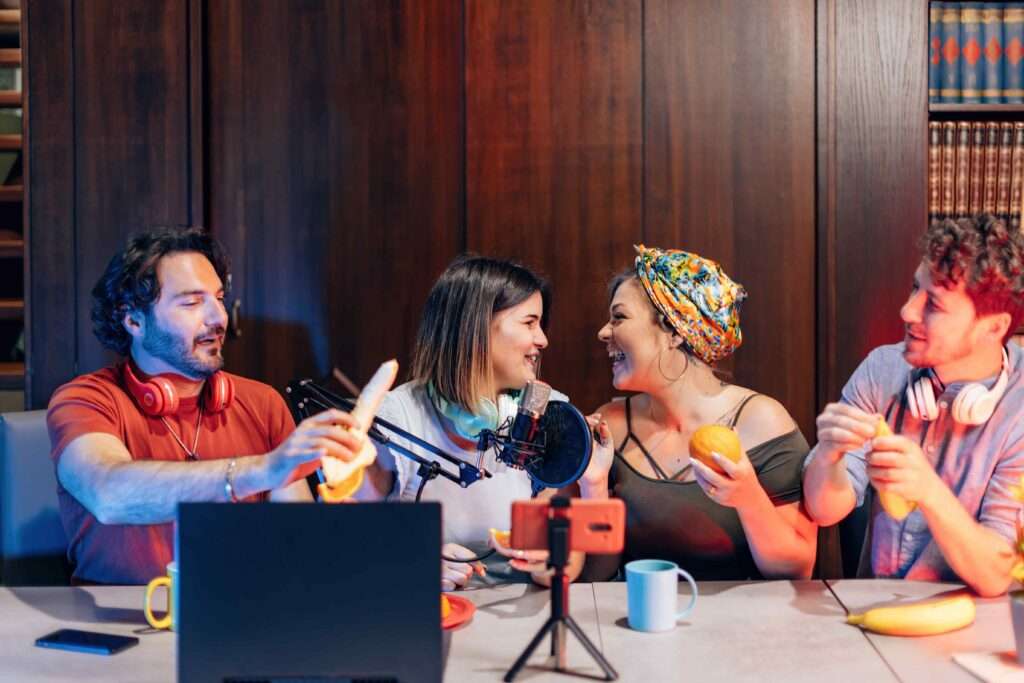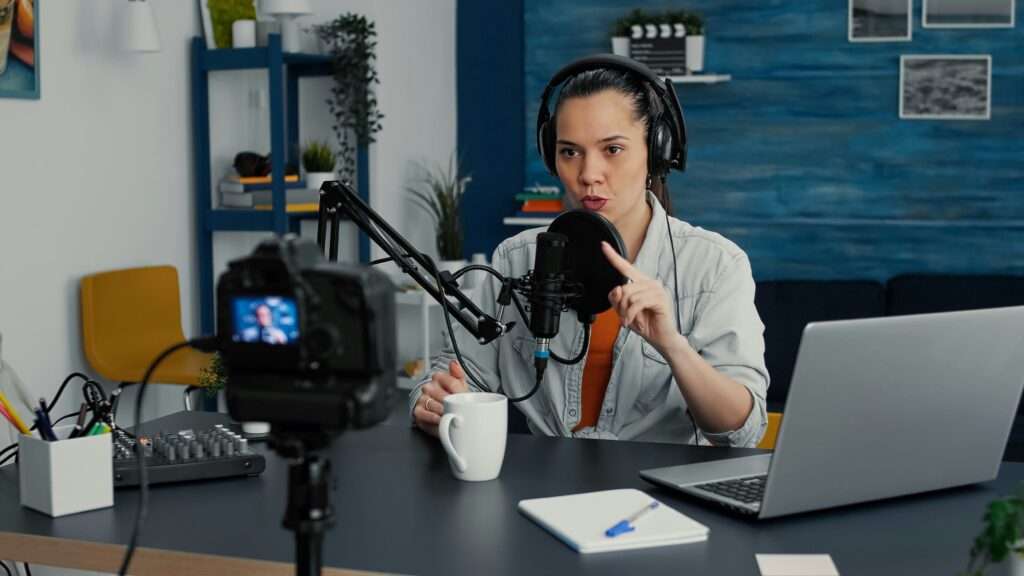As a podcaster, you want to create an environment that welcomes and engages all your listeners.
And that means including and addressing topics like diversity, representation, and accessibility. Luckily, this guide is here to help you do just that. Read on for comprehensive and effective strategies to foster an inclusive, respectful, and accessible podcast environment.
Representation Matters in Podcasts
First things first, let’s talk about representation. It’s crucial to have a diverse range of voices on your podcast. By featuring guests from different backgrounds including race, ethnicity, gender identity, disabilities, or neurodivergent individuals, you can broaden the appeal of your content and make it resonate with a wider audience. Did you know that around 43% of monthly U.S. podcast listeners are non-white?
- Invite guests with various cultural backgrounds: Reach out to people from different races, ethnicities, and cultures who can share their unique perspectives and experiences.
- Include people with disabilities and neurodivergent individuals: Invite speakers who identify as disabled or neurodiverse to provide valuable insights into these communities’ experiences.
Mindful Language Use and Avoiding Stereotypes
Now, let’s tackle mindful language use. It’s all about being aware of the words we choose and using appropriate pronouns. Respect and inclusivity go hand in hand, so make sure to use gender-neutral pronouns like “they/them” when referring to people. And always ask your guests about their preferred pronouns before recording. Oh, and steer clear of offensive language too. It’s important to educate yourself on potentially insensitive terms or phrases that could hurt or exclude certain groups. The National Center on Disability and Journalism Style Guide can be a helpful resource in this regard.
Address Sensitive Topics with Empathy
Sensitive topics can be tricky to navigate, but with empathy, we can create meaningful conversations. When discussing topics like race or mental health, approach them with empathy and understanding rather than perpetuating stigmas, through insensitive commentary or jokes at marginalized groups’ expense. Listen actively to your guests and avoid making assumptions based on someone’s background. Each person has their own experiences, right? And when it comes to mental health, be mindful of your language. Acknowledge the challenges faced by those affected by mental issues and provide resources for support, such as the National Alliance on Mental Illness (NAMI).
Remember, by promoting representation, using mindful language, and addressing sensitive topics with empathy, you can create a podcast that’s welcoming and engaging for all your listeners. So go ahead, make your content diverse, respectful, and accessible.
Incorporate Accessibility Features into Your Podcasts
You want everyone to enjoy your podcasts, right? Well, one way to make sure that happens is by incorporating accessibility features. Trust us, it’s not just a nice thing to do—it can expand your listener base and create a more inclusive atmosphere.
First up, let’s think about our hearing-impaired friends. You can provide transcripts alongside your audio files. That way, those who can’t hear the audio can still follow along and engage with your awesome content. It’s a simple way to make your podcasts accessible to everyone.
Oh, and when it comes to online stuff like show notes or resources, make sure they’re designed with accessibility in mind. You can follow the Web Content Accessibility Guidelines (WCAG) to ensure that people with disabilities who rely on assistive technologies like screen readers, can access your content without any issues. Accessibility is all about inclusion, so make sure you follow through with our recommendations!
Educate Yourself about Diverse Cultures and Backgrounds
Now, let’s talk about being inclusive and diverse in your podcasting. It’s super important to educate yourself about different cultures and backgrounds. You don’t want to misrepresent anyone or make your listeners feel excluded. So, before interviewing guests, take some time to learn about their cultural background, experiences, and perspectives. This way, you can ask informed questions and have meaningful conversations that resonate with your audience.
If you’re discussing specific cultural practices or traditions on your podcast, credit the appropriate sources. It’s a way to show respect for those who hold these customs dear and to prevent unintentional cultural appropriation. Plus, it’s just good practice to give credit where credit is due.
By incorporating accessibility features and educating yourself about diverse cultures and backgrounds, you can create podcasts that reach and resonate with a wide range of listeners. Don’t forget to market and promote your podcast effectively to make sure it reaches these communities.
Market and Promote Your Podcast in Diverse Communities
Want to make sure your podcast reaches diverse communities and resonates with a wide range of listeners? Well, we’ve got some tips to help you do just that.
First up, let’s get social! Engage with diverse audiences on platforms like Facebook, Twitter, and LinkedIn. Share your content, join conversations, and connect with people who might be interested in your podcast. It’s a great way to spread the word and reach new listeners from different backgrounds.
Next, let’s focus on events and conferences. Attend industry gatherings like the Podcast Movement conference. There, you can meet fellow creators, learn from the best, and build partnerships that promote diversity and inclusivity within the podcasting community. Here, networking is key.
But it’s not just about marketing. It’s also about listening, learning, and collaborating. Feedback from marginalized listeners is gold. It helps you shape your content and create a more inclusive podcast. So, actively seek out input from your audience. Encourage comments on social media or through direct emails. Embrace the feedback and use it to make your podcast even better.
And speaking of collaboration, teaming up with like-minded podcasters is a fantastic idea. Connect with other content creators who share your goals of promoting diversity and inclusivity. Online communities, like the Women of Color Podcasters group on Facebook, are a great place to find awesome collaborators.
Remember, by engaging with diverse audiences, listening to feedback, and collaborating with others, you can create a podcast that’s inclusive and speaks to people from all walks of life.

FAQs: How to Address Diversity and Inclusivity in Your Podcast Content
How to Address Diversity and Inclusivity in Your Podcast Content
To address diversity and inclusion in podcast content, it is important to take intentional steps. Here are some ways to do so:
- Invite guests with diverse backgrounds to share their experiences and perspectives.
- Be mindful of language use and avoid stereotypes.
- Discuss sensitive topics empathetically and respectfully.
- Incorporate accessibility features like transcripts and accessible web design principles.
- Educate yourself about different cultures and engage with diverse communities when marketing your podcast.
How to Promote Diversity and Inclusion Through Conversation
Promoting diversity and inclusion through conversation requires intentional effort. Here are some ways to do so:
- Include guests from various cultural backgrounds, disabilities, or neurodivergent individuals.
- Use appropriate pronouns for each guest while avoiding offensive language.
- Handle discussions on race respectfully and tackle mental health issues sensitively.
- Encourage open dialogue that fosters understanding between people of different experiences.
How to Support Diversity and Inclusivity Within Your Role
As a podcast creator or editor, you can support inclusivity by taking the following steps:
- Research guest speakers’ backgrounds thoroughly before inviting them onto the show.
- Credit sources properly to avoid cultural appropriation.
- Engage with diverse audiences on social media platforms.
- Attend events for networking opportunities.
- Embrace feedback from marginalized listeners.
- Collaborate with like-minded podcasters who share similar values.
How to Showcase Diversity and Inclusion
Showcasing diversity and inclusion is important to ensure that all voices are heard. Here are some ways to do so:
- Feature a wide range of voices representing various ethnicities, gender identities/expressions, sexual orientations, socio-economic statuses, abilities, religions, ages, political beliefs, educational levels, professional fields, industries, interests, hobbies, and perspectives.
- Ensure that promotional materials reflect this commitment using inclusive imagery and captions.
- Showcase episodes highlighting underrepresented groups.
Conclusion
If you want to make sure that your podcast is welcoming to everyone, it’s crucial to keep diversity and inclusion in mind when you’re planning it. If you want to make your podcast more inclusive and reach a wider audience, there are a few things you can do: You can invite guests from different cultural backgrounds, be mindful of the language you use, make sure your podcast is accessible to everyone, learn about different cultures, market your podcast to diverse communities, and team up with people who share your values.
Just a quick reminder that it’s super important to listen to feedback from marginalized listeners and approach sensitive topics with empathy. We understand how crucial it is to have inclusivity in podcasts here at Resonate Recordings. Want to know how we can help you achieve your inclusivity and diversity goals? Contact us today to learn more about our post-production and turnkey podcasting services.












